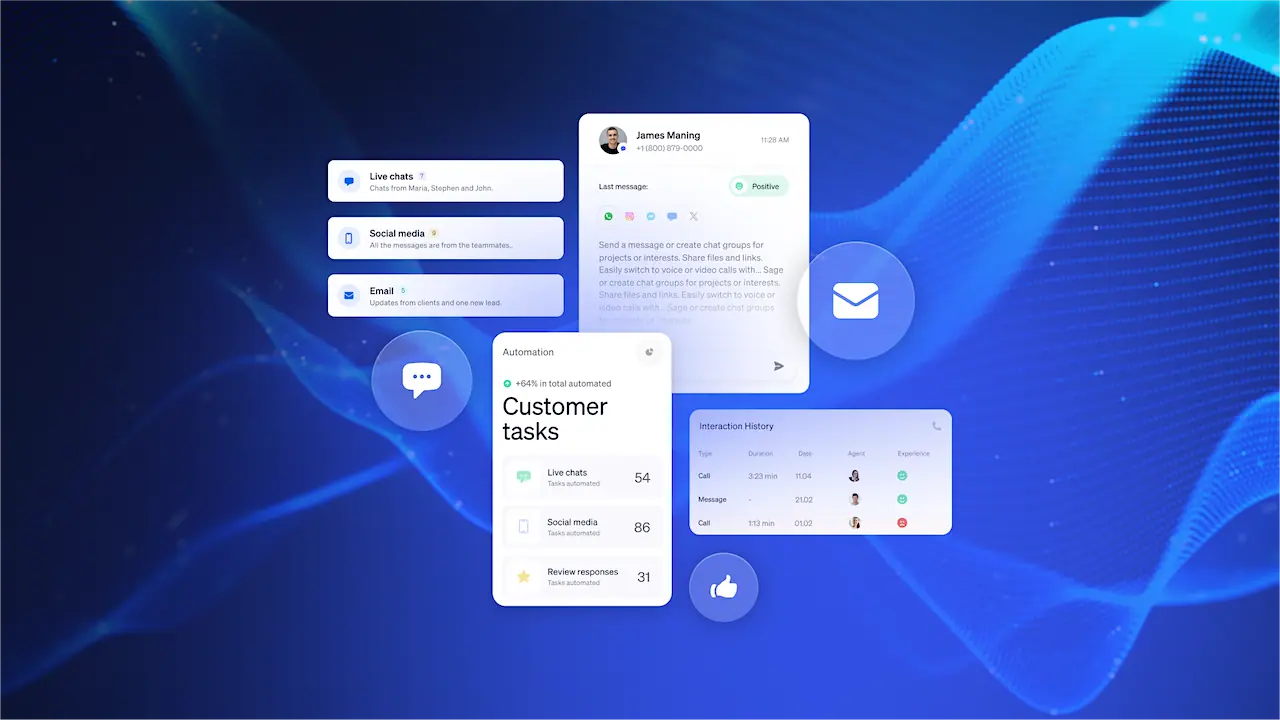With 76% of U.S. adults shopping online and 57% of the world’s consumer spending happening digitally, offering an exceptional digital customer experience (CX) is essential for any brand or organization. And yet customer satisfaction rates in the US currently sit at all-time lows.
Brands’ inability to offer a seamless customer experience, problematic experiences with customer chatbots, and consumers’ worries about finances lead to dissatisfied customers across the board. This means that brands that can develop their own digital CXs will gain a significant competitive advantage in their market sector.
Where does your CX strategy stand with AI?
Take the AI Maturity assessment to get personalized recommendations on how to enhance your CX.
If you follow the guidance and advice in this article, your organization will stand out from the crowd of companies failing to meet modern consumer demands.
What Is Digital CX?
Digital CX, short for digital customer experience, refers to the cumulative effect of all customer interactions with a brand through digital channels that collectively shape the customer’s perception of and engagement with that brand.
This concept encompasses various aspects of a company’s digital presence and services. It includes the user-friendliness of the company website, the navigational ease of mobile applications, and social media inquiry response time.
Digital CX also covers the effectiveness of AI-powered chatbots, personalization levels in email marketing campaigns, and the efficiency of online customer support systems.

The Importance of Digital CX
By prioritizing digital CX, businesses can create a competitive advantage, drive customer satisfaction, and, ultimately, boost their bottom line.
Thus, investing in digital CX provides several significant benefits for businesses:
Enhanced customer satisfaction and loyalty
A seamless digital experience fosters customer satisfaction, which is crucial for business success. Satisfied customers become repeat buyers and brand advocates, positively impacting a company’s growth and reputation.
Improved customer retention
Modern customers easily switch between brands, as they’re always searching for an improved experience.
Thus, your brand or organization will significantly improve its customer retention rates if you offer a superior digital CX. Indeed, improving customer retention by 5% can lead to an increase in profits of between 25% and 95%. This underscores the substantial financial impact of customer loyalty.

Increased sales and revenue
A well-designed digital experience directly influences sales.
Businesses remove purchase barriers by optimizing website navigation, providing clear product information, and streamlining the checkout process. This optimization results in higher conversion rates, increased average order values, and increased lifetime value of any customer.
Strengthened brand reputation
Brand reputation is now largely shaped by online experiences.
A strong digital presence, characterized by excellent customer experiences, significantly enhances brand perception and trust. Positive digital interactions, responsive customer service, and user-friendly platforms all contribute to a favorable brand image, influencing customer decisions in your favor.

Key Channels of Digital CX
To create a comprehensive digital CX strategy, you must consider all the channels on which your customers interact with your brand. Let’s explore the key players:
Website
Your website is often the first point of contact between your brand and potential customers. It’s like your digital storefront, open 24/7. A well-designed, intuitive website can provide:
- Clear product information
- Easy navigation
- Helpful customer support resources
- Smooth purchasing options
Remember, your website must be functional, fast, and optimized for all devices.
SMS/text messaging
Business text messaging is fast becoming an integral part of customer service and engagement. Here’s how to use it effectively:
- Set up systems for both inbound and outbound text messages
- Route messages to staff members who can provide immediate, helpful responses
- Use texting for appointment reminders, order updates, and quick customer service queries
The key with SMS is to use it as a two-way communication channel, not just a broadcast medium.

Mobile app
Having a mobile app lets your consumers interact with your brand as seamlessly as possible. Your app should offer:
- On-the-go access to your products or services
- Easy-to-use customer support features
- Personalized user experiences based on user preferences and behavior
Remember, a clunky or buggy app can do more harm to your brand’s reputation than good, so it’s worth your time to invest in quality development and regular updates.
Social media
Social platforms are powerful tools for fostering customer engagement. Use social media to:
- Respond quickly to customer inquiries
- Share valuable content
- Build a community around your brand
- Gather customer feedback and actionable insights
Cultivating an active, responsive, and authentic social media presence will help endear your business and brand to your consumers.

Email remains a crucial channel for digital CX. It’s perfect for:
- Personalized marketing campaigns
- Transactional communications (order confirmations, shipping updates, etc.)
- Customer support follow-ups
The trick is to ensure your emails are valuable and not spammy. Use data to personalize content and timing for maximum impact.
Contact center
Sometimes, customers just want to talk to a real person (understandably so!). A modern contact center should offer:
- Phone support for complex issues
- Live chat for quick questions
- Self-service options like FAQs and knowledge bases
The goal is to provide options that suit different customer preferences and query types.

Digital Customer Experience Functions
Now that we’ve covered the key channels, let’s dive into the functions that make up a solid digital CX strategy.
Customer journey mapping
Customer journey mapping involves creating a comprehensive roadmap of your customer’s experience across digital platforms.
By visualizing this customer experience journey, you can gain deeper insights into your customers’ interactions with your brand. This understanding allows you to more effectively enhance your digital customer experience strategy, ensuring that each touchpoint adds value to the overall customer experience.
Data analytics
Collecting and analyzing customer data is crucial to understanding customer behavior patterns, identifying preferences, and uncovering pain points.
With data analytics, you can tailor your offerings to more precisely meet customer needs, ultimately improving satisfaction and loyalty. However, always prioritize customers’ data privacy and security to maintain their trust in your brand and comply with regulations.

Technology investment
You need the right tools to deliver top-tier digital CX, mainly, a customer relationship management (CRM) system, an analytics platform, and a customer engagement tool.
For instance, a CRM system provides a unified view of customer interactions, analytics platforms can offer insights into customer behavior, and customer engagement tools help your business more effectively reach out to customers across various channels.
Employee training
Investing in employee training is crucial if you want to equip your staff with the necessary digital skills and ensure they understand the importance of digital CX.
Your team having the necessary digital CX skills will improve the quality of customer interactions and boost employee satisfaction. Remember, happy employees often lead to happy customers, creating a positive cycle that benefits both your team and your clientele.
Omnichannel strategy
Customers today expect a seamless end-to-end experience across all channels. An effective omnichannel approach ensures a cohesive customer journey with consistent messaging across all platforms, thus allowing customers to switch between channels without losing context. It also gives your team a unified view of the customer.
Self-service options
Many customers prefer to find answers on their own, making self-service options an important part of your digital CX strategy.
Empower your customers with comprehensive FAQs, intuitive knowledge bases, and AI-powered chatbots to address common queries. These self-service tools will reduce support costs and increase customer satisfaction by providing immediate answers.
Personalization
Personalization for each unique consumer is a critical component of profitable customer experience management. By leveraging customer data, you can tailor product recommendations, customize email content, and offer personalized, real-time discounts or promotions. The more relevant your offerings, the more likely customers are to engage with your brand and make a purchase.

Proactive support
Don’t wait for problems to arise; proactively anticipate customer needs.
This approach involves sending reminders for renewals or necessary actions, offering help based on browsing or purchase history, and providing tips and best practices for using your products. Proactive support shows customers you think about their needs before they even ask, which can significantly enhance their perception of your brand.
Mobile optimization
Ensure your website is responsive on all devices, your emails look great on mobile, and your checkout process is smooth on smartphones. Many customers will only interact with your brand on mobile devices, so a subpar mobile experience will have a significant negative impact on your digital CX.
Remember to test and optimize your mobile offerings regularly, considering factors like load time, navigation ease, and touch-friendly interfaces to provide mobile users with the best possible experience.
Social listening
Social listening helps you catch and address issues before they escalate, understand your customers’ sentiments about your brand, and identify trends and opportunities.
You can use social listening tools to monitor conversations about your brand across various platforms. This proactive approach allows you to engage with customers in real time, address concerns quickly, and capitalize on positive sentiment to build brand loyalty.
AI and automation
Implement AI-powered chatbots to provide 24/7 customer service, use automated email sequences based on customer behavior, and employ machine learning to predict customer needs and preferences. The key to AI technologies is to use them to enhance, not replace, the human touch in customer service.

Choosing a Digital CX Provider
Selecting the right digital CX provider is crucial to effectively implement your strategy. Here’s what to look for:
Platform capabilities
When assessing platform capabilities, focus on features that directly impact your digital CX strategy. Look for providers offering comprehensive omnichannel support that enables seamless customer interactions across web, mobile, social media, and other digital touchpoints.
Evaluate your customer’s journey using mapping tools, allowing you to visualize and optimize each stage of their digital interaction with your brand. Also consider the platform’s analytics capabilities, particularly its ability to provide real-time insights into customer behavior and sentiment across digital channels.

Finally, examine the provider’s AI and machine learning capabilities for personalization and predictive analytics. Ensure the platform can integrate with your existing CRM, marketing automation, and e-commerce systems to provide a unified view of the customer.
Customer support
In the context of digital CX, customer support goes beyond basic troubleshooting. Look for a provider that offers specialized expertise in digital CX strategies.
Its support team should be able to advise on best practices for improving your digital touchpoints, optimizing your customer journey, and leveraging data to obtain better customer insights. Consider providers that have dedicated customer success managers who can help align the platform’s capabilities with your specific digital CX goals.
Additionally, evaluate each provider’s track record in helping businesses similar to yours improve key digital CX metrics like customer satisfaction scores, Net Promoter Scores, and customer retention rates.

Onboarding
The onboarding process for a digital CX platform should be tailored to your business’s specific digital ecosystem. Look for providers that comprehensively audit your current digital touchpoints as part of their onboarding process.
They should help you map your existing customer journeys across digital channels and identify areas for improvement. Providers should also offer training sessions focused on using their tools for journey mapping, personalization, and digital analytics.
Consider whether a provider has guidance on change management, as implementing a new digital CX strategy often requires organizational processes and culture shifts.
Scalability
When considering scalability in the context of digital CX, look beyond handling increased volume. Evaluate whether the platform can adapt to evolving digital channels and customer expectations by asking questions like:
- Can it easily incorporate new digital touchpoints as they emerge?
- Does it offer advanced features like AI-driven chatbots or predictive analytics that you might need as your digital CX strategy matures?

Consider whether the provider regularly updates its platform with new digital CX capabilities based on market trends. Also, assess its ability to handle increasingly complex customer data as you gather more insights across your digital channels. The right provider should be able to support your digital CX strategy as it grows in both scale and sophistication.
Create the Ultimate Digital CX With Nextiva
Investing in digital CX is essential. With customer loyalty at an all-time low and consumer expectations higher than ever, businesses must create exceptional digital experiences to stand out and succeed.
As discussed, digital CX goes beyond technology — it creates meaningful and enjoyable interactions that drive customer retention. Remember to focus on key channels: your website, your mobile app, social media, and your contact center. Each channel significantly shapes your customers’ perceptions and experiences.
Nextiva’s unified CX solution empowers businesses of all sizes to upgrade their digital CX or implement one for the first time. Its comprehensive platform capabilities, outstanding customer support, and scalable solutions make Nextiva an ideal partner to help you craft superior customer experiences.
Learn more about Nextiva’s Unified Customer Experience Management Platform today.
Create an amazing CX.
Engage on every channel with Nextiva’s platform for the very best customer experience.

















 Customer Experience
Customer Experience 









